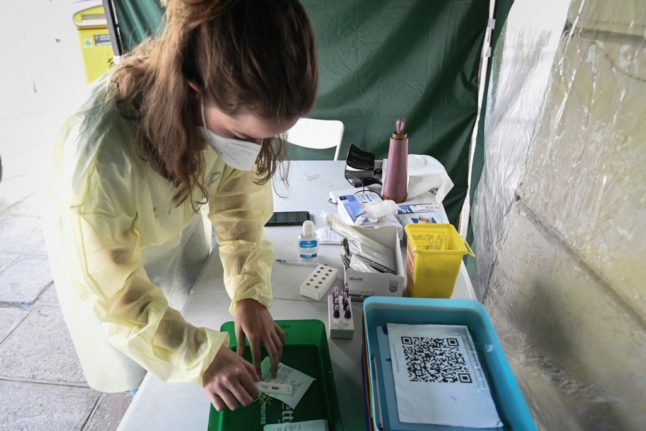The latest figures, from France’s public health agency, come ahead of a video-conference meeting on Monday in which President Emmanuel Macron and key members of his government will discuss new Covid safety measures.
Officials are concerned about the effect of the rapid spread of the Omicron variant.
Already on Friday, the health authority recommended adults receive a booster jab three months after their initial vaccination.
Now the government is moving to make the health pass issued to the vaccinated valid only if people accept the booster jab.
READ ALSO: What will change when France’s health pass becomes a vaccine pass?
The pass is required for access to cafes, restaurants and public spaces, as well as for international travel.
Some regions have already enacted their own safety measures.
At the end of last month, for example, officials in Savoie reintroduced the compulsory wearing of masks, not just in indoor public spaces, but outdoors too — a move just adopted in neighbouring Italy.
READ ALSO: Masks now obligatory in all markets in France
The latest figures mark a dramatic rise since the beginning of the month: on December 4th, the numbers broke 50,000 for the first time before rising steadily.
To date, France has recorded 122,546 deaths from the coronavirus. So far, 76.5 percent of the population is fully vaccinated.



 Please whitelist us to continue reading.
Please whitelist us to continue reading.
Great, now they are cat hing up with the UK oerhaps they could open the border again ( as it obvioysly hadn’t stopped the spread of Omicron) so we can see loved ones.
Great, now they are catching up with the UK perhaps they could open the border again ( as it obviously hasn’t stopped the spread of Omicron) so we can see loved ones.
I agree border restrictions make no sense now the French rate of infection is high and omicron is well-established. It made sense to buy time for a week or two when the new variant actually was new, little present in France and very much an unknown quantity. That is no longer the case.
The UK government too needs a more realistic approach – I suspect it takes pleasure in appearing to uphold a “strong” border, but the reasons are political rather than scientific.
Absolutely right – closing the border was only ever a political decision by Macron – nothing to do with Public Health !
What isn’t stated is how many people were tested and what percentage tested positive as compared to the recent past. The lines at testing sites have been pretty long of late and with more tests come more positives. And how many of the positives were asymptomatic? What has been the hospitalization rate and the rate of serious illnesses? Reporting just the top line of record infections is not good journalism.